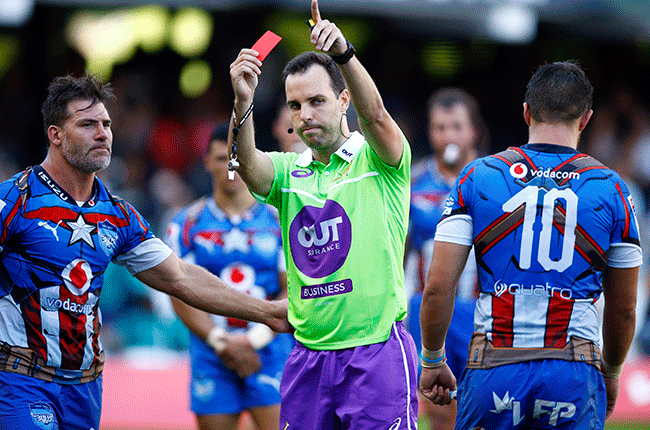

Mike Fraser showing a red card
Steve Haag/Gallo Images
- There are mixed views on the imminent ‘trial’ of a sub being allowed on 20 minutes after a red-card offence.
- Eventual infusion of a player off the bench would help rebalance a game in cases where the step has been harsh.
- Potentially quarter of the game with 14 men is still a fair enough deterrent to any possible, fresh boom in thuggery.
Tinkering with rugby’s unions laws … I consider it a necessary evil.
Correction: I prefer to think of it, ideally, as a very occasional necessary evil.
You must make allowance in this world for evolution, and rugby should be no exception to that.
What I don’t like is when the phenomenon becomes too frequent and far-reaching: to me the Varsity Cup – often a deliberately fertile landscape for annual, early-season “experimentation” in South Africa – has slightly lost rather than gained allure in recent seasons because of the variety of often gimmicky tweaks introduced.
Perhaps that’s just me, I concede.
But what I am reasonably excited about, as several law-change trials are effectively conducted with New Zealand’s Super Rugby Aotearoa – kicking off on Saturday – is the commitment to a replacement being allowed on the field 20 minutes after any issuing of a red card.
I have seen a mixed reaction to that step, on both Twitter and from some rugby-specialist scribes and commentators.
One forceful voice against the move recently, for example, was Chris Foy of the UK’s Daily Mail.
“Clearly this is a move designed to eradicate the growing issue of matches being wrecked by dismissals – especially early on – for acts which are not malicious, but require severe action, such as accidental contact with the head,” he said.
“But it would be better to implement World Rugby’s orange card proposal, which would give officials 15 minutes to review marginal incidents and upgrade to a red card if required.
“The problem with all law amendments is that they are adopted with often commendable intentions but soon become subject to manipulation and abuse.
“Part of the rationale for this innovation is to ensure a ‘fair contest’ for fans, players and coaches. But what is fair about violent conduct barely denting a team’s chances of victory?
“And while a quest to maximise the quality of the spectacle is understandable, especially at the moment, it can’t rely on a renewed tolerance of lawlessness. Rugby’s Wild West days were supposed to be in the past.”
He said the move was “ludicrous” and amounted to a “cheats’ charter”.
My conflicting view is that the “Wild West” days Foy refers to, largely are the stuff of history, indeed, and won’t suddenly be revisited because of this innovation … regular, overt thuggery, brawling and blood-shedding haven’t been significant stains on rugby for at least the last two decades.
I see a bigger picture: I have lost count of the number of times I have been watching matches (whether at stadiums or on television) and whoever may be next me quite rightfully sighs “ah well, there goes the contest” if a player is red-carded, especially when it occurs early in a game.
While there are famous, isolated exceptions, we all know that almost unfailingly the team reduced to 14 players, if there is meaningful time left, succumbs on the scoreboard at the finish.
It is also almost indisputably true to say that many red-card banishments are either extremely borderline, downright wrong or unjust -remember Bismarck du Plessis’ rotten fate for the Springboks, Auckland, 2013? – or subjectively ruled by the referee and/or television match official.
In cases like those, the element of reprieve allowed in infusing a substitute after 20 minutes is a pleasing rebalancer, to my way of thinking.
I also fail to see how the now-trialling, new rule will somehow inspire teams or their brains trusts to more maliciously begin targeting key opposition players for foul play because of the “protection” of a reinforcement eventually becoming permissible after a red card.
Twenty minutes (or quarter of a match) is still a pretty long time to be down to 14 players, after all.
No, that’s not a dice any right-minded rugby people would be wishing to roll too often, do you agree?
*Follow our chief writer on Twitter: @RobHouwing



